Practice the AP 9th Class Biology Bits with Answers Chapter 1 Cell its Structure and Functions on a regular basis so that you can attempt exams with utmost confidence.
AP State Syllabus 9th Class Biology Bits 1st Lesson Cell its Structure and Functions with Answers
I. Choose the correct answers
Question 1.
Primarily cells are studied under
A) optical microscope
B) compound microscope
C) electron microscope
D) none
Answer:
A) optical microscope
Question 2.
The outermost covering of animal cell is
A) cell wall
B) plasma membrane
C) nuclear membrane
D) nucleolar envelop
Answer:
B) plasma membrane
![]()
Question 3.
Cell membrane or plasma membrane is made up of
A) lipids
B) proteins
C) both lipids and proteins
D) cellulose
Answer:
C) both lipids and proteins
Question 4.
Identify the selectively permeable membrane.
A) cell wall
B) cell membrane
B) tonoplast
D) nuclear membrane
Answer:
B) cell membrane
Question 5.
Cell wall is present in
A) animals
B) humans
C) plants
D) zooplanktons
Answer:
C) plants
Question 6.
Nucleus was discovered by
A) Robert Hooke
B) Robert Brown
C) Rudolf Virchow
D) Schwann
Answer:
B) Robert Brown
Question 7.
It acts as cells control room
A) cell membrane
B) nucleus
C) mitochondria
D) nucleolus
Answer:
B) nucleus
Question 8.
This part of the cell bears genetic information.
A) Nucleus
B) Nucleolus
C) Ribosomes
D) Golgi complex
Answer:
A) Nucleus
Question 9.
Identify the prokaryotic cell.
A) Bacterium
B) Cyanobacteria
C) Paramoecium
D) Both Bacterium and Cyanobacteria
Answer:
D) Both Bacterium and Cyanobacteria
![]()
Question 10.
This participates in intracellular transport.
A) Endoplasmic reticulum
B) Lysosomes
C) Golgi complex
D) Ribosomes
Answer:
A) Endoplasmic reticulum
Question 11.
Smooth endoplasmic reticulum helps in the manufacture of
A) proteins
B) lipids
C) carbohydrates
D) vitamins
Answer:
B) lipids
Question 12.
Rough endoplasmic reticulum helps in the manufacture of
A) lipids
B) carbohydrates
C) proteins
D) vitamins
Answer:
C) proteins
Question 13.
In vertebrate liver cells it plays a crucial role in detoxifying many poisons and drugs
A) smooth endoplasmic reticulum
B) rough endoplasmic reticulum
C) lysosomes
D) vacuoles
Answer:
A) smooth endoplasmic reticulum
Question 14.
Suicide bags of the cell is
A) Lysosome
B) Ribosome
C) Nucleosome
D) Golgi complex
Answer:
A) Lysosome
Question 15.
The number of mitochondria present in each cell are about
A) 100 – 200
B) 150 – 300
C) 100 – 150
D) 100 – 300
Answer:
C) 100 – 150
Question 16.
The power house of the cell is
A) Lysosomes
B) Mitochondria
C) Ribosomes
D) Vacuole
Answer:
B) Mitochondria
![]()
Question 17.
The primary function of chloropiasts is to carry out
A) Respiration
B) Photosynthesis
C) Nutrition
D) Transport
Answer:
B) Photosynthesis
Question 18.
Who observed cell division for the first time ?
A) Rudolf Virchow
B) Robert Hooke
C) Hugodevris
D) Robert Brown
Answer:
A) Rudolf Virchow
Question 19.
The fluid inside the nucleus is known as
A) Nucleoplasm
B) Cytoplasm
C) Protoplasm
D) Germplasm
Answer:
A) Nucleoplasm
Question 20.
Chloropiasts are present in
A) roots
B) green leaves
C) dried leaves
D) flowers & fruits
Answer:
B) green leaves
Question 21.
Leucoplasts are
A) green
B) red
C) white
D) blue
Answer:
C) white
Question 22.
Nucleus was named by
A) Camillo Golgi
B) Schleiden
C) Robert Brown
D) Virchow
Answer:
C) Robert Brown
Question 23.
Characteristics of the organism determined by
A) Lysosomes
B) Nucleus
C) Mitochondria
D) Plastids
Answer:
B) Nucleus
![]()
Question 24.
Which of the following organelles involved in secretion ?
A) nucleus
B) mitochondria
C) golgi complex
D) plastid
Answer:
C) golgi complex
Question 25.
Cell membrane is made up of mainly
A) lipids and fats
B) lipids and proteins
C) proteins and fats
D) lipids, fats and proteins
Answer:
B) lipids and proteins
Question 26.
The colourless plastids are
A) Chloropiasts
B) Chromoplasts
C) Leucoplasts
D) None
Answer:
C) Leucoplasts
Question 27.
Cell wall is made up mainly of
A) Glucose
B) Fructose
C) Maltose
D) Cellulose
Answer:
D) Cellulose
Question 28.
Name the cell organell that regulates and controls all the functions of a cell.
A) Ribosomes
B) Lysosomes
C) ER
D) Nucleus
Answer:
D) Nucleus
Question 29.
Cytoblast refers to
A) ER
B) Golgi complex
C) Ribosomes
D) Nucleus
Answer:
D) Nucleus
Question 30.
The proteins produced in the ribosomes are altered slightly in
A) ER
B) Golgi Complex
C) Mitochondria
D) Lysosomes
Answer:
B) Golgi Complex
![]()
Question 31.
This cell organell contains destructive enzymes.
A) Chloroplast
B) Nucleolus
C) Nucleus
D) Lysosomes
Answer:
D) Lysosomes
Question 32.
These are “the traps of solar energy”.
A) Lysosomes
B) Ribosomes
C) Chloropiasts
D) Nucleus
Answer:
C) Chloropiasts
Question 33.
The basic unit of life is
A) Body
B) Cell
C) Blood
D) Tissue
Answer:
B) Cell
Question 34.
“Storage sacs” of the cell
A) Lysosomes
B) Ribosomes
C) Vacuole
D) Nucleolus
Answer:
C) Vacuole
Question 35.
This converts the light energy into chemical energy.
A) Lysosomes
B) Mitochondria
C) Chloroplast
D) Nucleus
Answer:
C) Chloroplast
Question 36.
Leucoplasts store
A) starch
C) proteins
B) oil
D) all
Answer:
D) all
Question 37.
Read the following statements.
a) Plastids are present only in plants.
b) Lysosomes contain non-destructive enzymes.
A) Both a, b are correct
B) a correct, b incorrect
C) b correct, a incorrect
D) Both a, b are incorrect
Answer:
B) a correct, b incorrect
![]()
Question 38.
Read the following statements.
a) Rough ER is the site of protein manufacture
b) Robert Brown discovered Nucleus in 1835
A) Both a, b are correct
B) a correct, b incorrect
C) b correct, a incorrect
D) Both a, b are incorrect
Answer:
B) a correct, b incorrect
Question 39.
Identify the wrongly matched pair.
1) Stomata – gaseous exchange
2) Leucoplasts – storage of carbohydrates
3) Golgi complex – package of lipids
A) 1, 2
B) 2, 3
C) 1, 3
D) 3 only
Answer:
D) 3 only
Question 40.
Read the following statements.
a) Cell wall is made up of cellulose and it is dead in nature.
b) Plasma membrane is made up of lipids and proteins and it is living.
A) Both a, b incorrect
B) a correct, b incorrect
C) b correct, a incorrect
D) Both a, b correct
Answer:
D) Both a, b correct
Question 41.
The plants which we can observe more chloroplasts are :
A) Algae
B) Fungi
C) Bacteria
D) None
Answer:
A) Algae
Question 42.
The cells arranged in Rheo leaf are
A) circle
B) in rows
C) irregular
D) diagonally
Answer:
A) circle
Question 43.
The organell present in the centre of the cheek cell is
A) Mitochondria
B) Golgi
C) Nucleus
D) Ribosomes
Answer:
C) Nucleus
Question 44.
The stain used to observe nucleus in cheek cells is
A) Safranine
B) Methyl orange
C) Black dye
D) All the above
Answer:
D) All the above
![]()
Question 45.
Which solution is used to observe mitochondria under the microscope ?
A) Janus green – B
B) Safranine
C) Glycerine
D) Methylene Blue
Answer:
A) Janus green – B
Question 46.
Which coloring reagent used in your classroom to see nucleus ?
A) Phenolpthalene
B) Methylene blue
C) Alcohol
D) Glycerine
Answer:
B) Methylene blue
Question 47.
The Red blood cells have less life span because
A) presence of haemoglobin
B) presence of nucleus
C) absence of nucleus
D) presence of nucleolus
Answer:
C) absence of nucleus
Question 48.
Packing of various substances in the cell are
A) Nucleus
B) Mitochondria
C) Golgi apparatus
D) Plastids
Answer:
C) Golgi apparatus
Question 49.
The organell which generate and stores energy is
A) golgi
B) mitochondria
C) nucleus
D) ribosomes
Answer:
B) mitochondria
Question 50.
The reason for colour changes in tomatoes (Green – White – Yellow – Red) is
A) Endoplasmic reticulum
B) Plastids
C) Nucleolus
D) Cell membrane
Answer:
B) Plastids
Question 51.
Cell theory was proposed by
A) Schleiden
B) Schwann
C) Both A & B
D) Rudolf Virchow
Answer:
C) Both A & B
![]()
Question 52.
Identify the labelled part in the diagram.
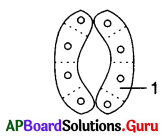
A) Chloroplast
B) Pore
C) Nucleus
D) Guard cell
Answer:
D) Guard cell
Question 53.
Name the given picture.
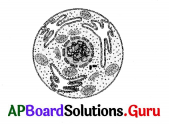
A) Animal cell
B) Plant cell
C) Chloroplast
D) ER
Answer:
A) Animal cell
Question 54.
Identify the cell organelle in the below picture.

A) Mitochondria
B) Nucleus
C) Golgi
D) Chloroplast
Answer:
D) Chloroplast
Question 55.
Name the labelled part in the shown cell organell.
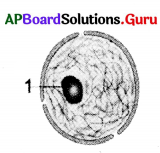
A) Nucleus
B) Nucleolus
C) DNA
D) RNA
Answer:
B) Nucleolus
Question 56.
Identify the cell organelle shown in the diagram.
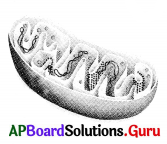
A) Chloroplast
B) Golgi complex
C) ER
D) Mitochondria
Answer:
D) Mitochondria
Question 57.
Identify the cell organelle.

A) Golgi complex
B) ER
C) Lysosomes
D) Nucleus
Answer:
A) Golgi complex
Question 58.
Identify the cell organelle.

A) Golgi complex
B) Endoplasmic Reticulum
C) Lysosomes%0
D) Nucleus
Answer:
B) Endoplasmic Reticulum
![]()
Question 59.
Arrange the following in correct order.
A) tissue – organism – organs – organ system – cell.
B) organism – organs – organ system – tissue – cell.
C) cells – tissue – organs – organ system – organism
D) none of the above
Answer:
C) cells – tissue – organs – organ system – organism
Question 60.
The function of a tiny cell in a large body of an organism is
A) Functional unit
B) Structural unit
C) Acts as individual unit
D) All the above
Answer:
D) All the above
Question 61.
I appreciate stomata because they are helpful in
A) Photosynthesis
B) Respiration
C) Transpiration
D) All the above
Answer:
D) All the above
Question 62.
The function of cell wall in plants is
A) in active
B) protection
C) exerts pressure
D) B and C
Answer:
D) B and C
Question 63.
Choose the correct answer from the following matching.
List – A
1) Nucleus
2) Cell
3) Cell Division
4) Cell theory
Answer:
List – B
a) Schleiden
b) Virchow
c) Robert Hook
d) Robert Brown
A) 1 – a, 2 – d, 3 – c, 4 – b
B) 1 – a, 2 – b, 3 – c, 4 – d
C) 1 – b, 2 – a, 3 – d, 4 – c
D) 1 – d, 2 – c, 3 – b, 4 – a
Answer:
D) 1 – d, 2 – c, 3 – b, 4 – a
Question 64.
Choose the correct answer from the following matching.
List – A
1) Prokaryote
2) Ribosomes
3) Smooth ER
List – B
a) Lipid synthesis
b) Protein factories
c) Bacterium
A) 1 – a, 2 – b, 3 – c
B) 1 – b, 2 – c, 3 – a
C) 1 – c, 2 – a, 3 – b
D) 1 – c, 2 – b, 3 – a
Answer:
D) 1 – c, 2 – b, 3 – a
Question 65.
Choose the correct matching from the following.
List – A
1) Suicidal bags
2) Mitochondria
3) Nucleus
List – B
a) Cheek cell
b) Onion peel cell
c) Lysosomes
A) 1 – b, 2 – c, 3 – a
B) 1 – c, 2 – a, 3 – b
C) 1 – a, 2 – b, 3 – c
D) 1 – c, 2 – b, 3 – a
Answer:
D) 1 – c, 2 – b, 3 – a
![]()
II. Match the following :
1)
| Group – A | Group – B |
| 1) Robert Brown | A) Cell division |
| 2) Robert Hooke | B) Botanist |
| 3) Rudolf Virchow | C) Zoologist |
| 4) Schleiden | D) Nucleus |
| 5) Schwann | E) Observed cell for the first time |
| F) Electron microscope |
Answer:
1) Robert Brown – D) Nucleus
2) Robert Hooke – E) Observed cell for the first time
3) Rudolf Virchow – A) Cell division
4) Schleiden – B) Botanist
5) Schwann – C) Zoologist
2)
| Group – A | Group – B |
| 1) Nucleus | A) Cell’s power house |
| 2) Prokaryotes | B) Suicide bags |
| 3) Lysosomes | C) Protein synthesis |
| 4) Mitochondria | D) Regulate and controls all the functions of a cell. |
| 5) Rough endoplasmic reticulum | E) Bacterium |
| F) Lipid synthesis |
Answer:
1) Nucleus – D) Regulate and controls all the functions of a cell.
2) Prokaryotes – E) Bacterium
3) Lysosomes – B) Suicide bags
4) Mitochondria – A) Cell’s power house
5) Rough endoplasmic reticulum – C) Protein synthesis
3)
| Group – A | Group – B |
| 1) Mitochondria | A) Cyto skeleton |
| 2) Lysosomes | B) Secrection |
| 3) Nucleus | C) Cell’s power house |
| 4) ER | D) Cell’s control room |
| 5) Golgi complex | E) Suicidal bags |
Answer:
1) Mitochondria – C) Cell’s power house
2) Lysosomes – E) Suicidal bags
3) Nucleus – D) Cell’s control room
4) ER – B) Secrection
5) Golgi complex – A) Cyto skeleton
4)
| Group – A | Group – B |
| 1) Semi permeable | A) Chloroplast |
| 2) Traps solar energy | B) Prokaryote |
| 3) Cynobacteria | C) Cell wall |
| 4) Detoxification | D) Plasma membrane |
| 5) Withstand greater changes in surroundings | E) SER |
Answer:
1) Semi permeable – D) Plasma membrane
2) Traps solar energy – A) Chloroplast
3) Cynobacteria – B) Prokaryote
4) Detoxification – E) SER
5) Withstand greater changes in surroundings – C) Cell wall
Question 66.
The below diagram represents a/an ………………..
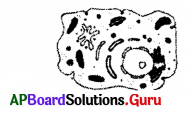
A) Plant cell
B) Animal cell
C) Virus
D) Bacterial cell
Answer:
B) Animal cell
Question 67.
These organelle of the cell play an important role in protein synthesis ?
A) Lysosomes
B) Nucleus
C) Ribosomes
D) Mitochondria
Answer:
C) Ribosomes
Question 68.
This part of the cell is known as control unit of the cell
A) Nucleus
B) Chloroplast
C) Mitochondria
D) Vacuole
Answer:
A) Nucleus
![]()
Question 69.
Nuclear membrane is absent in ………………. type of cells.
A) Eukaryote
B) Prokaryote
C) Protista
D) Fungi
Answer:
B) Prokaryote
Question 70.
The following are known as suicidal bags of the cells
A) Ribosomes
B) Vacuoles
C) Lysosomes
D) Golgi complex
Answer:
C) Lysosomes
Question 71.
What is the correct order of the steps to follow for using a microscope to observe vacuoles in plant cells ?
1) Place on a glass slide
2) Take a piece of stem of a succulent plant
3) Stain with dilute saffranine solution.
4) Take thin cross section
A) 2, 4, 3,1
B) 1, 2, 3, 4
C) 2, 3, 4, 1
D) 4, 3, 1, 2
Answer:
A) 2, 4, 3,1
Question 72.
Which one of these cell organelles, do all living things on earth depend on directly or indirectly for food ?
A) Lysosomes
B) Mitochondria
C) Ribosomes
D) Chloroplasts
Answer:
D) Chloroplasts
Question 73.
The cell organelle responsible for the release of energy in the body is ……………
A) Lysosomes
B) Golgi complex
C) Endoplasmic reticulum
D) Mitochondria
Answer:
D) Mitochondria
Question 74.
The fluid inside the cell: cytoplasm :: the fluid inside the nucleus : ……………….
A) Protoplasm
B) Nucleoplasm
C) Cellular fluid
D) Both B and C
Answer:
B) Nucleoplasm
Question 75.
Read the following statements.
A : One function of ER is to channelise proteins.
B : SER does not play any role in detoxifying many poisons and drugs.
A) Both statements are true
B) Both statements are false
C) Only A is true
D) Only B is true
Answer:
C) Only A is true
![]()
Question 76.
The correct statement related to autotrophs
A) getting mechanical energy from solar energy
B) receives glycogen as a nutrient from other organism
C) converts solar energy into chemical energy
D) all are correct
Answer:
C) converts solar energy into chemical energy
Question 77.
The stain used to observe mitochondria is
A) Saffranin
B) Janus green-B
C) Janus green-A
D) Crystal Violet
Answer:
B) Janus green-B
Question 78.
The genetic material of the cell is found in the ……………….
A) Golgi apparatus
B) Vacuole
C) Rough endoplasmic reticulum
D) Nucleus
Answer:
D) Nucleus
Question 79.
Match the following.
a) Chloroplast 1) Power houses
b) Mitochondria 2) Suicide bags
c) Lysosomes 3) Photosynthesis
A) a – 3, b – 2, c -1
B) a – 2, b – 1, c – 3
C) a – 1,b – 2, c – 3
D) a – 3, b – 1,c – 2
Answer:
D) a – 3, b – 1,c – 2
Question 80.
 This Part is ………………
This Part is ………………
A) Ribosome
B) Lysosome
C) Protoplasm
D) Cytoplasm
Answer:
A) Ribosome
Question 81.
Which of the following statement is not correct?
i) All cells arise from the same cells.
ii) Vacuoles are the power houses of the cell.
iii) Prokaryotic cells have a nuclear membrane bound nuclear material
A) i, ii
B) ii, iii
C) i, ii, iii
D) i, iii
Answer:
B) ii, iii
Question 82.
The diagrams given below are the or-ganelles of a cell.
Which of the following organelles is responsible for mechanical support and enzyme transport ?
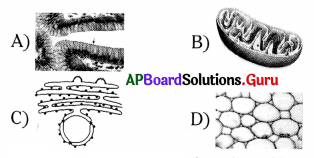
Answer:

![]()
Question 83.
Which of the following is NOT the function of a vacuole ?
A) Locomotion
B) Storage
C) Providing rigidity to the cell
D) Waste excretion
Answer:
A) Locomotion
Question 84.
Which of the cells is similar to the cell shown below ?
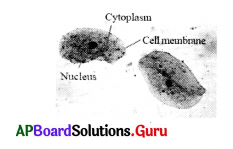
A) A mature RBC
B) A sperm
C) A cheek cell
D) A nerve cell
Answer:
C) A cheek cell
Question 85.
i) All living organisms are composed of cells and products of cells, ii) All cells arise from pre-existing cells.
Which theory explain the above state-ments ? JSSMREBELiC)
A) Origin of organs theory
B) Tissue culture theory
C) Cell theory
D) Permeable membrane theory
Answer:
C) Cell theory
Question 86.
Identify the cell organelle that helps in respiration :
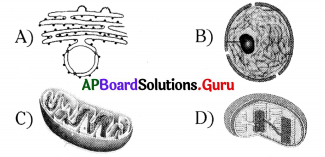
Answer:

Question 87.
Identify the wrongly matched one:
a) Lysosomes – Suicidal bags
b) Mitochondria – Power house of the cell
c) Vacuole – Lipid sacs
d) Ribosomes – Food factories
A) c, d
B) a, b
C) b, c
D) a, d
Answer:
A) c, d
Question 88.
In 1898 Camillo Golgi used compound microscope to observe the golgi complex.
Which type of microscope is used to observe cristae in mitochondria ?
A) Florescence microscope
B) Simple microscope
C) Electron microscope
D) Compound microscope
Answer:
D) Compound microscope
Question 89.
Observe the following questions. Based on the statements, what do we know about the organelle shown in the figure?
a) What is the shape of the organelle?
b) Does this help respiration?
c) Why is it called power house of the cell?
d) Is this organelle found in both plant and animal cells?
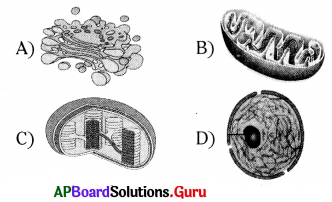
Answer:
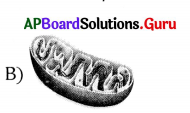
Question 90.
The following are used for observing chloroplast in your lab :
a) Rheoleaf
b) Slide
c) Microscope
d) Hydrochloric acid
A) b, c, d only
B) a, d only
C) b, c only
D) a, b, c only
Answer:
D) a, b, c only
Question 91.
Which of the following represents X and Y?
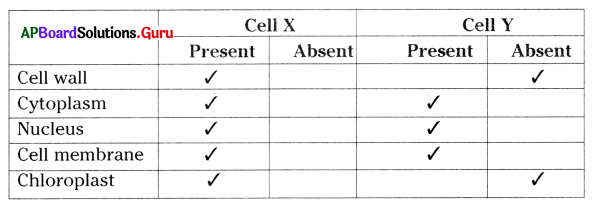
A) X – Animal cell, Y – Fungi Cell
B) X – Animal cell, Y – Plant Cell
C) X – Plant Cell, Y – Animal cell
D) X – Fungi cell, Y – Animal Cell
Answer:
C) X – Plant Cell, Y – Animal cell